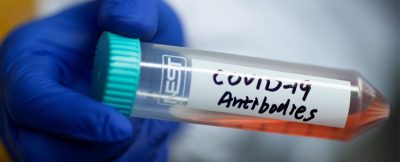Dutch Researchers Discover Effective Anti-COVID-19 Antibodies

Antibodies aren’t COVID-19 cures, but the discovery by Utrecht University researchers of a “human monoclonal antibody that prevents the SARS-CoV-2 virus (that produces COVID-19 disease) from infecting cultured cells” is a positive development.
It’s a step toward finding an effective treatment that may still be a long way off.
None so far exist despite claims by science know-nothing Trump, days earlier recommending disinfectants that can cause serious illness or death if ingested.
Despite many years of research, no vaccines were ever developed for malaria, dengue, HIV/AIDS, or coronaviruses.
If ever developed, their toxicity would be hazardous to human health and should be avoided — especially anything rushed to market by Big Pharma, prioritizing profits over human health.
Utrecht University research co-leader Professor Berend-Jan Bosch said work conducted by his team built on earlier efforts in “targeting the SARS-CoV that emerged in 2002/2003,” adding:
“Using this collection of SARS-CoV antibodies, we identified an antibody that also neutralizes infection of SARS-CoV-2 in cultured cells.”
“Such a neutralizing antibody has potential to alter the course of infection in the infected host, support virus clearance or protect an uninfected individual that is exposed to the virus.”
The antibody works by binding “to a domain” in SARS-CoV and SARS-COV-2, neutralizing and preventing them from spreading.
Bosch hopes that his team’s discovery will mitigate diseases caused by known and future coronaviruses that emerge from mutations.
Co-study leader Professor Frank Grosveld said the team’s discovery “provides a strong foundation for additional research to characterize this antibody and begin development as a potential COVID-19 treatment,” adding:
“The antibody used in this work is ‘fully human,’ allowing development to proceed more rapidly and reducing the potential for immune-related side effects.”
German-based test and measurement products firm HBM’s CEO Dr. Jingsong Wang called the antibody discovery “groundbreaking,” further research needed to learn if “can protect or reduce the severity of disease in humans.”
His company is eager “to advance development of the antibody with partners” by using the firm’s technology.
Research team member virologist Luka Cicin-Sain hailed the antibody breakthrough “that shows that we are on the right track for the development of a drug against Covid-19,” adding:
“In repeated experiments, we were able to show that this result is sustainable.”
Thousands of human antibodies were tested. Over 750 docked with both coronaviruses, preventing their further spread in infected patients.
Additional tests are underway to find the most effective ones in blocking infection.
Utrecht University researchers worked with biotech company Yumab, antibody clinical trials expected to begin this fall.
According to Science Magazine,
“(m)any researchers are optimistic that antibodies will relatively quickly prove their worth as a preventive or remedy that buys the world time until a” coronavirus cure is found.
High cost will limit their use when brought to market. For the uninsured and underinsured in the US and elsewhere, they’ll be too expensive when available.
Monoclonal antibodies are used to treat cancer and autoimmune diseases, few developed for infectious diseases.
Researcher James Crowe believes that in around “five years, (lower-cost) antibodies will become the principal tool used as a medical countermeasure in the event of an epidemic,” like what’s going on now.
Dozens of research teams are working on developing effective coronavirus antibodies.
Utrecht University’s team apparently succeeded first, additional work continuing as explained above.
*
Note to readers: please click the share buttons below. Forward this article to your email lists. Crosspost on your blog site, internet forums. etc.
Award-winning author Stephen Lendman lives in Chicago. He can be reached at [email protected]. He is a Research Associate of the Centre for Research on Globalization (CRG)
His new book as editor and contributor is titled “Flashpoint in Ukraine: US Drive for Hegemony Risks WW III.”
http://www.claritypress.com/LendmanIII.html
Visit his blog site at sjlendman.blogspot.com.

